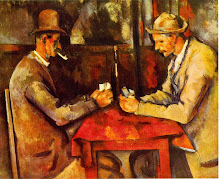Alright, so I've never been exposed to ten minute plays before these readings, and already I'm super opinionated about them. I'm not sure if this is a good thing or not. The positive aspect of me being opinionated is that I know which play of the four I want to emulate. The negative is that I'm nearly positive I'm not giving some of these the chance they deserve. Anyway, on to the judgment.
A Bowl Of Soup - Okay, so it's hard to get a sense for this one because it's clear that it's all about performance, after all one character is silent on stage for the entirety of the thing, and as readers we're not even given any stage directions for what he is doing. Is he sitting? Is he pacing? Is he riding a tricycle around Eddie in circles? Entirely up to the director. Of course, that's cool if you're primarily interested in performance, as it seems like an awesome play to think about staging/directing/acting in, but from the perspective of beginning playwrights it's not super useful as we're still getting a feel for how our own work will translate to stage. Also, while the ten minute play does in fact seem like a good platform to deliver a neatly wrapped philosophical point, the impermanence of ourselves and our memory seems to easy and to trite, even for ten minutes. (Even in context of the AIDS epidemic. While this was a theme in Angels and America, it was much richer and more complicated there). Though I like the idea. Perhaps something more unresolved and richer, like say a couple having a debate about determinism that's really a metaphor for their improprieties. In this play the point is really a punchline, and the rest of the play kind of builds to it, but a lot of it is kind of unrelated. Next!
That Midnight Rodeo - The approach here seems to be committed to being a "slice of life" or ten minutes in a couples life, trying to avoid the obvious artifice of being a play. We join an argument that it's hinted at that the couple has already had, and we leave without any sense of resolution. Also the play is full of vocabulary that may be foreign to the audience, furthering a sense of realism. I have one thing to say to all this: zzzzzzzz (although the ending is quite quite awesome and theatrical, and serves as a nice intersection between realism and theater). While I think realism onstage is an awesome and worthy thing to write, I really have little to no interest in it. In my mind it's a vegetarian cheetah, a creature unaware of its niche in a changing environment, and doomed to do worse than the better adapted giraffe. (Oh god biology metaphor. I'm sorry). In other words it seems like realism is already being done better by documentary, film, tv, etc. What theater does that I like is, well, theatrics and expansive imagined realities. Next.
The Man Who Couldn't Dance - Money. I love it. This is the thing right here. Interestingly enough, the characters establish themselves, even on the page as there's no character descriptions accompanying this one. Yet I have an even firmer sense of who they are than any of the other plays, and as a director would feel even more locked in to a certain way of having Gail and Eric played. What really makes this play for me is it's completeness in 10 minutes. We're given the build up to the argument, the argument itself, confessions, and even some resolution. It's complete, it's beautiful, and I don't feel like I'm opening a window to some couple's life for a few minutes. It's a play. Though I must confess I also love it because of its relationship to something that's sort of been a theme in my plays this semester, and that's the theme of repressed sincerity. Eric confessing he can't dance is very moving, as is his dynamic character change of him beginning to dance on stage. For my ten minute play I'm going to aim for the same completeness on stage, including dynamic character change.
The Roads That Lead Here - The main hook of the play for me is interest in the brother's project. And I mean, making an audience fully interested in a play, even if it's just for ten minutes seems a feat to a playwright just starting out, so I'm not going to disparage using absurdness or weirdness in these ten minute plays. It seems like a good way to keep the audience engaged for such a short time. However I worry that it might feel gimicky on stage. Though, I mean, given my fear of writing drama I'm sure my first ten minute play will end up something like this.
Tuesday, March 30, 2010
Subscribe to:
Post Comments (Atom)

No comments:
Post a Comment